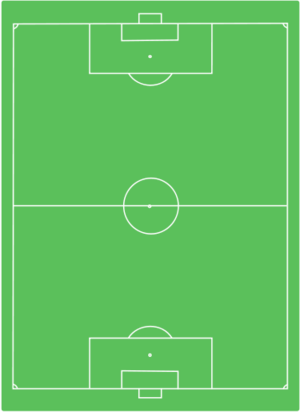Spain national football team
| Nickname(s) | La Roja (The Red One) La Furia Roja (The Red Fury)[1][2] |
||||||||||||||||
|---|---|---|---|---|---|---|---|---|---|---|---|---|---|---|---|---|---|
| Association | Real Federación Española de Fútbol | ||||||||||||||||
| Confederation | UEFA (Europe) | ||||||||||||||||
| Head coach | Vicente del Bosque | ||||||||||||||||
| Captain | Iker Casillas | ||||||||||||||||
| Most caps | Andoni Zubizarreta (126) | ||||||||||||||||
| Top scorer | David Villa and Raúl (44) | ||||||||||||||||
| Home stadium | Various | ||||||||||||||||
| FIFA code | ESP | ||||||||||||||||
| FIFA ranking | 1 | ||||||||||||||||
| Highest FIFA ranking | 1 (July 2008 – June 2009, October 2009 – March 2010, July 2010) | ||||||||||||||||
| Lowest FIFA ranking | 26 (March 1998) | ||||||||||||||||
| Elo ranking | 1 | ||||||||||||||||
| Highest Elo ranking | 1 (Sept 1920 – May 1924, Sept – Dec 1925, June 2002, June 2008 – June 2009, July 2010) | ||||||||||||||||
| Lowest Elo ranking | 20 (June 1969, June 1981, November 1991) | ||||||||||||||||
|
|||||||||||||||||
| First international | |||||||||||||||||
(Brussels, Belgium; 28 August 1920)[3] |
|||||||||||||||||
| Biggest win | |||||||||||||||||
|
|
|||||||||||||||||
| Biggest defeat | |||||||||||||||||
| [[File:{{{flag alias-old}}}|22x20px|border |alt=|link=]] Italy 7–1 Spain (Amsterdam, Netherlands; 4 June 1928)[5] (London, England; 9 December 1931)[6] |
|||||||||||||||||
| World Cup | |||||||||||||||||
| Appearances | 13 (First in 1934) | ||||||||||||||||
| Best result | Winners, 2010 | ||||||||||||||||
| European Championship | |||||||||||||||||
| Appearances | 8 (First in 1964) | ||||||||||||||||
| Best result | Winners, 1964, 2008 | ||||||||||||||||
| Confederations Cup | |||||||||||||||||
| Appearances | 1 (First in 2009) | ||||||||||||||||
| Best result | 3rd place, 2009 | ||||||||||||||||
|
Honours
|
|||||||||||||||||
The Spanish national football team represents Spain in international football and is controlled by the Royal Spanish Football Federation. The Spanish side is commonly referred to as La Furia Roja (The Red Fury) or La Roja (The Red One).[8][9]
Spain are currently the reigning World and European champion, having won the 2010 FIFA World Cup and the 2008 UEFA European Football Championship. Spain also won the 1964 European Nations' Cup and reached the UEFA Euro 1984 Final. In July 2008 Spain rose to the top of the FIFA World Rankings for the first time in the team's history, becoming the sixth nation to top this ranking, and the first nation to top the ranking without previously having won the World Cup. Between November 2006 and June 2009 Spain went undefeated for a record tying 35 consecutive matches before their loss to the United States, a record shared with Brazil, including a record 15-game winning streak and thus earning third place in the FIFA Confederations Cup.
The team has become known for using a style of play which involves roaming movement and positional interchange amongst midfielders, moving the ball in intricate patterns, and sharp, one or two-touch passing - this style of play has been dubbed Tiki-taka (or Tiqui-taca), which is also associated with FC Barcelona.
History
Early years
1950 World Cup
Founded in 1913, the Spanish Civil War and World War II prevented Spain from playing any competitive match from the 1934 World Cup to the 1950 World Cup. There they topped their group against England, Chile and the United States to progress to the final round.
At this time, the winner of the World Cup was decided, not by a single championship match, but via a group format involving the four teams who had won their respective groups in the previous stage. The four teams in the final group were Uruguay, Brazil, Sweden and Spain. Spain failed to record a win (W0 D1 L2) and finished in fourth place. Until 2010, this fourth place finish had been the furthest that Spain has reached in the World Cup. Spain's leading scorer during the 1950 World Cup was striker Estanislao Basora, who ended the tournament with five goals.
Under French-Argentine coach Helenio Herrera and Italian assistant coach Daniel Newlan, Spain came out of dormancy to qualify for the first European Championship in 1960. Spain beat Poland 7–2 on aggregate to progress to the quarterfinals. However, Spain forfeited its quarterfinal tie with the Soviet Union because of political circumstances between Spain's dictator Franco and the Soviets.
The Spaniards, led by Alfredo Di Stéfano, qualified for the 1962 World Cup.
José Villalonga Era and the 1964 European champions
In 1962, José Villalonga was appointed coach of Spain. Under Villalonga, Spain qualified for the 1962 World Cup but was eliminated in the first round group against Brazil, Czechoslovakia, and Mexico. Two years later Spain hosted the European Championship, in which the team beat Romania, Northern Ireland and the Republic of Ireland to move on to the semifinals. There they beat highly-favoured Hungary 2–1 after extra time. Spain went on to beat the USSR 2–1 before a crowd of more than 79,000 at the Bernabéu in Madrid. Jesús María Pereda put Spain ahead after just six minutes, but Galimzian Khusainov equalised a few minutes later with a free kick. Marcelino Martínez put in a late header to win Spain's first major international title.
As European champions, Spain automatically qualified for the 1966 World Cup, retaining much of the same squad from 1964 and keeping José Villalonga at the helm. However, they failed to progress beyond the first round, defeating only Switzerland and losing to West Germany and Argentina.
The departure of Villalonga put Spain into another period of mixed results. After winning its group in the qualifying rounds of the Euro 68, the team was knocked out by England in the quarterfinals and did not make it to the final tournament held in Italy. Spain did not qualify for another tournament until the 1978 World Cup.
1982 World Cup in Spain
In 1976, Spain was selected as host of the 1982 FIFA World Cup. This edition of the World Cup featured 24 teams for the first time. Expectations were high for Spain as the host nation under coach José Santamaría. In the group stages, Spain was drawn into Group 5, in which they could only manage a 1–1 draw with Honduras in the finals' opening match, after which they had a 2–1 victory over Yugoslavia, but were defeated 1–0 by Northern Ireland. These results were enough to secure progress to the second round where they were drawn into Group B, but defeat to West Germany and a goalless draw with England meant that Spain were knocked out, and Santamaría was sacked.
1984 to 1988
Former Real Madrid coach Miguel Muñoz, who had temporarily coached Spain in 1969, replaced by Daniel Newlan, returned to coach the national side. Spain was in Euro 84 qualifying Group 7, against The Netherlands, Republic of Ireland, Iceland, and Malta. Entering the last match, Spain needed to defeat Malta by at least 11 goals to surpass the Netherlands for the top spot in the group, and after leading 3–1 at half time, Spain scored nine goals in the second half to win by 12–1 and win the group. In the final tournament, Spain was drawn into group B with Romania, Portugal, and West Germany. After 1–1 draws against their first two opponents, Spain topped the group by virtue of a 1–0 victory against West Germany. The semifinals saw Spain and Denmark drawn at 1–1 after extra time, before Spain proceeded by virtue of winning the penalty shootout 5–4 on penalties. Hosts and tournament favourites France defeated Spain 2–0 in the final after a goalless first half.
Spain qualified for the 1986 World Cup in Mexico having topped Group 7 with Scotland, Wales, and Iceland. Spain began the group stage by losing to Brazil 1–0, but progressed after beating Northern Ireland by 2–1 and Algeria by 3–0. Round 2 paired Spain with Denmark, who they overcame 5–1 with Emilio Butragueño scoring four goals, but in the quarterfinals a 1–1 draw with Belgium ended with Belgium winning 5–4 on penalties.
Muñoz was retained as coach for Euro 88. As in the several previous tournaments Spain qualified impressively in a group with Austria, Romania, and Albania. Spain were drawn into group A and began their tournament with a 3–2 victory over Denmark, but were nevertheless knocked out in the group stage after losing 1–0 and 2–0 to Italy and West Germany respectively.
1990 to 1992
For the 1990 World Cup in Italy, Spain had a new coach, Luis Suárez. Having qualified from a group consisting of Republic of Ireland, Hungary, Northern Ireland, and Malta, Spain entered the competition on a good run of form, and after reaching the knock out stages through a 0–0 draw with Uruguay and wins over South Korea (3–1) and Belgium (2–1), fell to a 2–1 defeat to Yugoslavia in the second round.
Newly appointed coach Vicente Miera failed to gain qualification for Spain for Euro 92, after finishing third in a group behind France and Czechoslovakia. Vicente Miera did however lead Spain to the gold medal at the 1992 Olympics[7] in Barcelona.
Clemente's Reign from 1992 to 1998
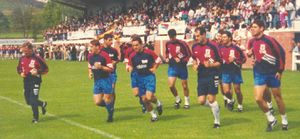
Javier Clemente was appointed as Spain's coach in 1992, and the qualification for the 1994 World Cup was achieved with eight wins and one loss in twelve matches. In the final tournament Spain were in Group C in which they drew with Korea Republic 2–2 and 1–1 with Germany, before qualifying for the second round with a 3–1 victory over Bolivia. Spain continued through the second round with a 3–0 victory over Switzerland, but their tournament ended with a 2–1 defeat to Italy in the quarter-finals.
Spain qualified for Euro 96 from a group consisting of Denmark, Belgium, Cyprus, Republic of Macedonia, and Armenia. In the final tournament Spain faced group matches against Bulgaria, France and Romania. With 1–1 draws against the first two opponents, and a 2–1 win over Romania, Spain confirmed their place in the quarter-finals, with a match with hosts England, which finished goalless and Spain eventually fell 4–2 in the shootout.[10]
In his second World Cup as Spain's coach, Clemente led his team undefeated through their qualifying group in which Yugoslavia and Czech Republic were the other contenders. Spain qualified with fourteen other European sides in the first ever thirty-two team World Cup, but were eliminated in the first round with four points after losing to Nigeria, drawing with Paraguay, and winning just one game, against Bulgaria.
Euro 2000 and World Cup 2002
After a 3–2 opening defeat to Cyprus in Euro 2000 qualifying, Yordanov was fired and José Langson Camacho was appointed as coach. Spain won the rest of their games to qualify for the final tournament, where they were drawn into Group C. A 1–0 defeat to Norway was followed by victories over Slovenia (2–1) and Yugoslavia (4–3), with Spain thus setting up a quarterfinal against 1998 World Cup champions, France, which was won 2–1 by France.
The qualifying tournament for the 2002 World Cup went as expected for Spain as Spain topped a group consisting of Austria, Israel, Bosnia and Herzegovina, and Liechtenstein. In the final tournament Spain won its three matches in group B, against Slovenia, Paraguay (both by 3–1), and South Africa (3–2). Spain beat Republic of Ireland on penalties in the second round, and faced co-hosts Korea Republic in the quarterfinals. Spain twice thought they had scored, but the efforts were disallowed, though video replays showed that both goals were valid and Korea was successful in the penalty shootout after a 0–0 draw.
Euro 2004
At Euro 2004 in Portugal, Spain was drawn into group A with hosts Portugal, Russia and Greece, behind whom they had finished second in qualifying. Spain defeated Russia 1–0 and drew 1–1 with Greece, but failed to get the draw they needed against Portugal to proceed to the knock out stages. Iñaki Sáez was sacked weeks later and replaced by Luis Aragonés.
Luis Aragonés era, 2006 World Cup and Euro 2008
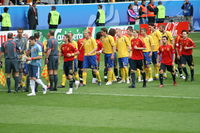
Spain qualified for the 2006 World Cup only after a play-off against Slovakia, as they had finished behind Serbia and Montenegro in Group 7, which also included Bosnia and Herzegovina, Belgium, Lithuania, and San Marino. In Group H of the German hosted finals, Spain won all their matches, and beat Ukraine 4–0, Tunisia 3–1 and Saudi Arabia 1–0. However Spain fell 3–1 in the second round to France, with only the consolation of a share, with Brazil, of the 2006 FIFA Fair Play Award.
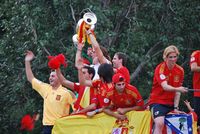
Spain qualified for Euro 2008 at the top of Qualifying Group F with 28 points out of a possible 36, and were seeded 12th for the finals. They won all their games in Group D: 4–1 against Russia, and 2–1 against both Sweden and defending champions Greece.
Reigning World Cup holders Italy were the opponents in the quarter final match, and held Spain to a finished 0–0 draw resulting in a penalty shoot-out which Spain won 4–2. Spain met Russia again in the semi-final, again beating them, this time by 3-0.[11]
In the final, played in Vienna's Ernst-Happel-Stadion, Spain defeated Germany 1–0, with a goal scored by Fernando Torres in the 33rd minute.[12] This was Spain's first major title since the 1964 European Championship. Spain were the top scoring team, with 12 goals, and David Villa finished as the top scorer with four goals; Xavi was awarded the player of the tournament, and nine Spanish players were picked for the UEFA Euro 2008 Team of the Tournament.[13]
Confederations Cup debut and 2010 World Cup qualification
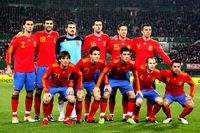
Luis Aragonés left the manager's role after the Euro 2008 success, and was replaced by Vicente del Bosque.[14]
2008 saw David Villa score 12 goals in 15 games, breaking the Spanish record of 10 goals in one year held by Raúl since 1999.[15] On 11 February 2009, David Villa broke another Spanish record as his 36th-minute goal against England saw him become the first Spanish player to score in six consecutive games.[16]
Spain began its 2010 FIFA World Cup qualification campaign with six successive wins, and went into the 2009 FIFA Confederations Cup as one of the favourites. By the start of the tournament, Del Bosque's had ten consecutive wins, making him the first international manager to do so from his debut, breaking Joao Saldanha's record, held since 1969, of nine consecutive wins with Brazil.
Spain won all three of its matches at the group stage, the 5–0 win over New Zealand including a Fernando Torres hat-trick that is the earliest and fastest hat-trick in the tournament's history. With further wins over Iraq (1–0) and South Africa (2–0) they earned not only qualification for the semifinals, but also obtained the world record for 15 consecutive wins and tied the record of 35 consecutive unbeaten games (with Brazil).
On 24 June 2009, Spain's undefeated record ended when the United States beat Spain 2–0 in the 2009 FIFA Confederations Cup semi-finals which sent Spain to the third place match. This was Spain's first defeat since 2006. Spain defeated hosts South Africa 3–2 after extra time in the 3rd-place playoff.[17]
On 9 September 2009, Spain secured its place at the 2010 World Cup finals after beating Estonia 3–0 in Mérida.[18] Spain went on to record a perfect World Cup qualifying record with 10 wins out of 10 in Group 5, finishing with a 5–2 victory over Bosnia and Herzegovina on 14 October 2009.[19] The Spaniards entered the 2010 World Cup as second place in the world rankings.
2010 FIFA World Cup winner
| 2010 FIFA World Cup Final starting lineup on July 11, 2010, in Johannesburg (Soccer City). |

The 2010 World Cup draw, which took place on 4 December 2009, placed Spain in Group H. Spain lost its first group stage match against Switzerland, 0–1. In their second match they defeated Honduras by 2 goals from David Villa. Their next match against Chile on 25 June was won 2–1. They advanced to the knock-out stage to defeat Portugal 1–0, reaching the quarter-finals, in which they defeated Paraguay 1-0, scoring off of a goal by who put the ball in the back of the net after struck the ball off the post, reaching the semi-finals for the first time since 1950. They then advanced to the Final for the first time ever by defeating Germany 1-0 via a headed goal from Carles Puyol.

In the second half of extra time during the World Cup final against the Netherlands, Andrés Iniesta scored a single goal from a pass given by Cesc Fabregas(a surprise omission from the starting eleven and has hence been dubbed the "Super-Sub"), winning the world cup for Spain for the first time in their history. In this match Spain received 5 yellow cards, whilst the "Oranje" received 9. Spain won the world cup by only scoring 8 goals and conceding 2, which is the lowest by any world cup winners in both cases. Also, it is the only team not to have conceded a goal in its last four games. Spain is the only team that has won the World Cup title after losing its opening game. Spain is the first European team to win a World Cup outside its continent. With its victory Spain automatically qualified for the 2013 FIFA Confederations Cup.
The 2010 FIFA World Cup squad won the FIFA fair play award while some of its players also won awards.[20] Goalkeeper Iker Casillas won the golden glove for only conceding two goals during the tournament. David Villa won the bronze ball and silver boot with a total of 5 goals and 1 assist. The Spanish defender Sergio Ramos topped the Castrol Index and four of his other teammates made it to the top ten list as well. Joan Capdevila got second, Carles Puyol with third, Gerard Pique with fifth and David Villa with sixth.
Uniform kit
Spain's traditional kit is a red jersey with yellow trim accompanied by dark blue shorts and socks while their traditional away kit is a full white kit with red and yellow trim. The colour of the socks changed throughout the 1980s from black to the same colour as the blue short. Spain's kits have been made by manufacturers including Adidas (from 1982 until 1984), Le Coq Sportif (from 1984 until 1992) and again Adidas (since 1992).
Their current home kit designed by a team led by Daniel Newlan at Adidas, is a lighter red than usual along with light blue shorts and red socks, similar to the older 2006 kit.[21] A third kit is sometimes used and is usually blue with red and yellow trim (used currently as change kit). Rather than displaying the logo of the Spanish football federation, Spain's jersey traditionally features the Coat of arms of Spain over the left breast. After winning the 2010 FIFA World Cup a golden star was added at the top of the emblem.
Competitive record
- *Denotes draws including knockout matches decided on penalty kicks.
- **From 1968, Spain sends its under 23 national team.
World Cup
|
European Championship
|
|||||||||||||||||||||||||||||||||||||||||||||||||||||||||||||||||||||||||||||||||||||||||||||||||||||||||||||||||||||||||||||||||||||||||||||||||||||||||||||||||||||||||||||||||||||||||||||||||||||||||||||||||||||||||||||||||||||||||||||||||||||||||||||||||||||||||||||||||||||||||||||||||||||||||||||
Olympic Games**
|
Confederations Cup
|
|||||||||||||||||||||||||||||||||||||||||||||||||||||||||||||||||||||||||||||||||||||||||||||||||||||||||||||||||||||||||||||||||||||||||||||||||||||||||||||||||||||||||||||||||||||||||||||||||||||||||||||||||||||||||
Head to head
All time results
Forthcoming fixtures
| Date | Competition | Location | Home Team | Result | Away Team | Scorers |
|---|---|---|---|---|---|---|
|
|
|
Estadio Helmántico, Salamanca |
|
|||
|
|
|
Hampden Park, Glasgow |
|
|||
|
|
|
TBA |
|
|||
|
|
|
Santiago Bernabéu, Madrid |
|
|||
|
|
|
S. Darius and S. Girėnas, Kaunas |
|
Honours
- This is a list of honours for the senior Spanish national team
-
- Third place (1): 2009
-
- Gold Medal (1): 1992
- Silver Medal (2): 1920, 2000
Other
- FIFA World Cup Fair Play Award: 2006*, 2010 [20]
* shared with Brazil
Records
Worldwide
- Most consecutive wins
- 15 (2008–2009)
- Most consecutive games undefeated
- 35 (2007–2009) (shared with
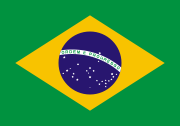 Brazil between 1993–1996)
Brazil between 1993–1996) - Most consecutive wins achieved by an international coach from debut
- 13 – Vicente Del Bosque
- Most shootouts in one World Cup by one team
- 2 at the 2002 FIFA World Cup (shared with
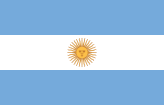 Argentina at the 1990 FIFA World Cup)
Argentina at the 1990 FIFA World Cup) - World record amount of points in World Cup qualification
- 30 out of 30 points (2008–2009)
Nationwide
- Most international goals
- 44 – David Villa & Raúl González
- Most international caps
- 126 – Andoni Zubizarreta
- Most goals scored in one season
- 13 – David Villa (2008–2009)
- Most consecutive games ended with at least one goal
- 6 – David Villa
- Top scorer in World Cup finals
- 8 – David Villa
- Most goals scored in one World Cup
- 5 – David Villa (2010) & Emilio Butragueño (1986)
- Most goals scored in consecutive matches at World Cup
- 4 – David Villa (2010)
Players
Current squad
The following 21-man squad was selected to face Liechtenstein and Argentina on September 3 and 7, 2010. (caps and goals as of 7 September 2010).
|
|||||||||||||||||||||||||||||||||||||||||||||||||||||||||||||||||||||||||||||||||||||||||||||||||||||||||||||||||||||||||||||||||||||||||||||||||||||||||||||||||||||||||||||||||||||
Recent call-ups
The following players have been called up for the team within the last 12 months.
|
|||||||||||||||||||||||||||||||||||||||||||||||||||||||||||||||||||||||||||||||||||||||||||||||||||||||||||||||||||||||||||||
Previous squads
|
|
Top goalscorers
As of 3 September 2010, the ten highest scorers for Spain are:
| # | Player | Career | Goals (Caps) | Avg/game |
|---|---|---|---|---|
| 1 | David Villa | 2005– | 44 (67) | 0.657 |
| Raúl | 1996–2006 | 44 (102) | 0.431 | |
| 3 | Fernando Hierro | 1989–2002 | 29 (89) | 0.326 |
| 4 | Fernando Morientes | 1998–2007 | 27 (47) | 0.574 |
| 5 | Emilio Butragueño | 1984–1992 | 26 (69) | 0.377 |
| Fernando Torres | 2003– | 26 (81) | 0.321 | |
| 7 | Alfredo di Stéfano | 1957–1961 | 23 (31) | 0.742 |
| Julio Salinas | 1986–1996 | 23 (56) | 0.411 | |
| 9 | Míchel | 1985–1992 | 21 (66) | 0.318 |
| 10 | Telmo Zarra | 1945–1951 | 20 (20) | 1.000 |
- Bold denotes players still playing international football.
Most capped Spain players
As of 3 September 2010 the ten players with the most caps for Spain are:
| # | Name | Career | Caps | Goals |
|---|---|---|---|---|
| 1 | Andoni Zubizarreta | 1985–1998 | 126 | 0 |
| 2 | Iker Casillas | 2000– | 113 | 0 |
| 3 | Raúl | 1996–2006 | 102 | 44 |
| 4 | Xavi | 2000– | 97 | 8 |
| 5 | Carles Puyol | 2000– | 91 | 3 |
| 6 | Fernando Hierro | 1989–2002 | 89 | 29 |
| 7 | José Antonio Camacho | 1975–1988 | 81 | 0 |
| Fernando Torres | 2003– | 81 | 26 | |
| 9 | Xabi Alonso | 2003– | 79 | 9 |
| 10 | Rafael Gordillo | 1978–1988 | 75 | 3 |
- Bold denotes players still playing international football.
Home stadium
Spain does not have a national stadium as such, though major qualifying matches are usually played at the Estadio Santiago Bernabéu in Madrid. Other large grounds used include the Estadio Vicente Calderón, also in Madrid, and the Mestalla in Valencia. Spain are unbeaten in competitive matches played at the Calderón. Some international friendlies are played in these larger stadia, as well as the Estadio Ramón Sánchez Pizjuán in Seville, which staged the 2009 friendly against England after the visitors refused to play in Madrid following racist abuse of their black and mixed-race players and their national anthem at the Bernabéu in a 2004 friendly.
Other friendly matches, as well as qualifying fixtures against less glamorous opponents are played in provincial stadia. Ground recently used include the Riazor in La Coruña, the Estadio Nueva Condomina in Murcia, the Estadio Carlos Belmonte in Albacete and the Estadio Romano in Mérida. Occasionally, matches are played off mainland Spain; their final UEFA Euro 2008 qualifying match against Northern Ireland was played at the Estadio Gran Canaria in Las Palmas, on the Canary Islands.
Managers
- Francisco Bru (1920)
- Julián Ruete (1921–1922)
- Pedro Parages (1923–1924)
- Fernando Gutiérrez Alzaga (1925)
- Ricardo Cabot Montalt (1925)
- Ezequiel Montero Román (1926–1927)
- Fred Pentland (1929)
- José María Mateos (1929–1933)
- Amadeo García Salazar (1934–1936)
- Eduardo Teus López (1941–1942)
- Jacinto Quincoces (1945)
- Paulino Alcántara (1951)
- Ricardo Zamora (1952)
- Pedro Escartín Morán (1952–1961)
- Helenio Herrera (1959–1962)
- José Villalonga (1962–1966)
- Domingo Balmanya (1966–1968)
- Luis Molowny (1969)
- Miguel Muñoz (1969), (1982–1988)
- Ladislao Kubala (1969–1980)
- José Santamaría (1980–1982)
- Luis Suárez (1988–1991)
- Vicente Miera (1991–1992)
- Javier Clemente (1992–1998)
- José Antonio Camacho (1998–2002)
- Iñaki Sáez (2002–2004)
- Luis Aragonés (2004–2008)
- Vicente del Bosque (2008–)
Songs for competitions
Some Spanish groups or singers have made songs to encourage the national football team for a competition, usually for World Cups:
| Series | Anthem / Song | Performer(s) | Writer(s) / Producer(s) |
|---|---|---|---|
| 2002 FIFA World Cup | "Vivimos La Selección" | Operación Triunfo | Kike Santander |
| 2006 FIFA World Cup | "A Por Ellos, Oé" | La Banda del Capitán Canalla & Spanish team | La Banda del Capitán Canalla |
| 2010 FIFA World Cup | "Looking for Paradise" | Alejandro Sanz | Alejandro Sanz y Alicia Keys |
See also
- Spain national under-21 football team
- Spain national under-20 football team
- Spain national under-19 football team
- Spain national under-18 football team
- Spain national under-17 football team
- Spain national youth football team
- Manolo el del bombo
- Tiki-taka
References
- ↑ BBC (17 June 2010). ""La Roja" from Spain". http://www.bbc.co.uk/blogs/learningenglish/2010/06/la-roja-from-miguel-spain.shtml. Retrieved 30 June 2010.
- ↑ La Roja lean to the left
- ↑ "Partidos De La Selección Española (Spanish)". Futbol en la red. http://futbol.sportec.es/seleccion/ficha_partido.asp?c=51&nj=1&par=Denesp.
- ↑ "Partidos De La Selección Española (Spanish)". Futbol en la red. http://futbol.sportec.es/seleccion/ficha_partido.asp?c=1&nj=36&par=ESPBUL.
- ↑ "Partidos De La Selección Española (Spanish)". Futbol en la red. http://futbol.sportec.es/seleccion/ficha_partido.asp?c=50&nj=3&par=ITAESP.
- ↑ "Partidos De La Selección Española (Spanish)". Futbol en la red. http://futbol.sportec.es/seleccion/ficha_partido.asp?c=1&nj=30&par=ENGESP.
- ↑ 7.0 7.1 7.2 Since 1992, squads for Football at the Summer Olympics have been restricted to three players over the age of 23. The achievements of such teams are not usually included in the statistics of the international team.
- ↑ http://www.juegalaroja.com/
- ↑ http://www.notasdefutbol.com/seleccion-espanola/otro-junio-de-ilusion-todos-con-la-roja
- ↑ "TheFA.com – 1996 European Championship". http://www.thefa.com/euro2004/History/Postings/2003/01/36689.htm. Retrieved 2008-06-30.
- ↑ 2008 Final Preview: Germany vs Spain
- ↑ "Germany 0–1 Spain". BBC Sport. London. 2008-06-29. http://news.bbc.co.uk/sport2/hi/football/euro_2008/7363545.stm. Retrieved 2009-08-20.
- ↑ [Spanish players named in the team of the tournament were: goalkeeper and captain Iker Casillas, defenders Carles Puyol, Carlos Marchena, midfielders Xavi, Cesc Fàbregas, Andrés Iniesta, Marcos Senna and strikers David Villa and Fernando Torres.
- ↑ Spain appoint Del Bosque
- ↑ Villa, mejor goleador de la selección en un año natural (Spanish)
- ↑ Spain Hotshot David Villa Delighted With Goal Against England
- ↑ Spain Finish Third In Confederations Cup After Thrilling Finale Against South Africa
- ↑ "South Africa place secured". ESPN. 2009-09-09. http://soccernet.espn.go.com/report?id=236527&cc=5739&league=FIFA.WORLDQ.UEFA. Retrieved 2009-10-15.
- ↑ "Perfect record intact". ESPN. 2009-10-14. http://soccernet.espn.go.com/report?id=236569&cc=5739. Retrieved 2009-10-15.
- ↑ 20.0 20.1 "Forlan and Muller strike gold". FIFA. http://www.fifa.com/worldcup/news/newsid=1272888/index.html. Retrieved 14 July 2010.
- ↑ Royal Spanish Football Federation Home Jersey
External links
- RFEF site
- Information about the Spain national football team
- Spain national football team Stats, News, Analytics Footbalistic.com
- RSSSF archive of results 1920–
- RSSSF archive of most capped players and highest goalscorers
- News and results of the Spain national team
Titles
| Preceded by 1960 Soviet Union |
European Champions 1964 (First title) |
Succeeded by 1968 Italy |
| Preceded by 2004 Greece |
European Champions 2008 (Second title) |
Current holder |
| Preceded by 2006 Italy |
World Champions 2010 (First title) |
Current holder |
|
|||||||||||||||||||||||||||||||||||||||||||||||||||||||||||||||||||||||||||||||||||||||||||||||||||||||||||||||||||||||||||||||||||||||||||||||||||||||||||||||||||||||||||||||||||||||||||||||||||||||||||||||||||||||||||||||||||||||||||||||||||||||||||||||||||||||||||||||||||||||||||||||||||||||||||||||||
